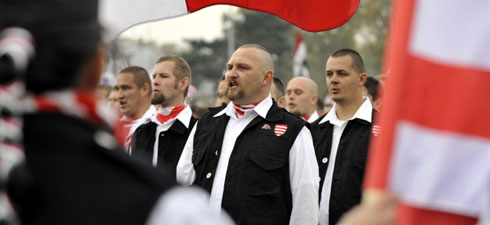Over the last two weeks, the Hungarian press has been alternately amused and exasperated by international media coverage of the first round of general elections, which took place on 11 April. Deploring the factitious exoticism in the portrayal of their country, several journalists noted that the BBC website, and the European edition of the Wall Street Journal illustrated their reports with photographs of voters dressed as hussars or wearing traditional peasant costumes. The Times published a photograph of neo-Nazis, asserting without proof that they were supporters of Jobbik, the extreme-right party that has attracted considerable media attention outside Hungary. The Guardian took three days to correct an article in which it mentioned an election meeting in the Romanian capital Bucharest.
Accused of misleading readers
In the days that followed, Hungarian columnists reacted angrily to commentary pieces focusing on "racist Hungary," which neglected to mention the fact that the first round of elections were won by the centre-right FIDESZ party with 53% of the vote. Jobbik, which scored 16.7%, was actually placed third after the socialist party. Some of the harshest criticism was directed at the press in Austria, which is the former imperial power in the region.
The senior editor of the website belonging to the weekly HVG accused the Die Pressespecial correspondent, Wolfgang Böhm,of deliberately misleading his readers. Specifically, Richard Hirschler was angered by the assertion "that there is no political force in Hungary to oppose the radicalism of the right," because "there have been a number of demonstrations against the Hungarian Guard [an extreme-right militia now abolished], which have met with the same success as the campaign against Haider in Austria." With regard to Böhm's advice to FIDESZ leader and future prime minister Viktor Orbán "to avoid appeals to national pride, but encourage private enterprise," Hirschler reminds his Austrian colleague "that private enterprise has been stymied by the scourge of corruption and high taxes — a situation which can only be addressed through good governance and a strong state. Thanks for your concern, but perhaps you should do your homework before handing out advice."
"Hungarian liberal left no longer exists"
In the weekly Heti Válasz, columnist Ferenc Horkay Hörcher launches a broadside at Paul Lendvai, who is considered to be a leading specialist on Hungarian politics. To judge from his article in the daily Kurier "the Austrian spin doctor is apparently unaware that 11 April marked the end of an era," remarks Horkay Hörcher. The Hungarian journalist goes on to accuse "the liberal left-wing media guru who adopts a purportedly disinterested Austrian perspective" of basing his analysis on the opinions of Hungarian politicians who have vanished from view in Hungary, and "casting doubt on the assessments of liberal left and centrist intellectuals who dare voice an opinion that is not aligned with his own. These fickle 'defectors' actually believe that a two thirds majority [which FIDESZ is expected to achieve on 25 April] makes for a credible future government."
Horkay Hörcher notes with some amusement that Lendvai's attempt to "fabricate an international tricolour" from the views of three writers with major reputations in the West — Péter Esterházy, Péter Nádas and György Konrád — fails to take into account an interview in the liberal left weekly, Magyar Narancs, in which Péter Nádas admits that "he has been very wrong about a lot of things in recent years." In the same interview, Nádas also went on to say that "the Hungarian liberal left no longer exists, but has voluntarily disbanded," which leads the Heti Válasz columnist to pose the following question: "If the famous writers distance themselves from Lendvai, will they also be labelled as defectors?" Hörcher's final words are for the waning influence of his Austrian colleague: "The practice of exerting pressure in Hungarian politics via Paul Lendvai was well established, but it has become obsolete in 2010."
Was this article useful? If so we are delighted!
It is freely available because we believe that the right to free and independent information is essential for democracy. But this right is not guaranteed forever, and independence comes at a cost. We need your support in order to continue publishing independent, multilingual news for all Europeans.
Discover our subscription offers and their exclusive benefits and become a member of our community now!












